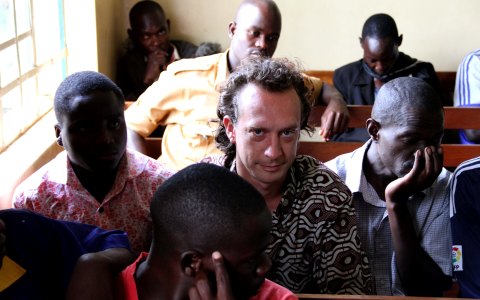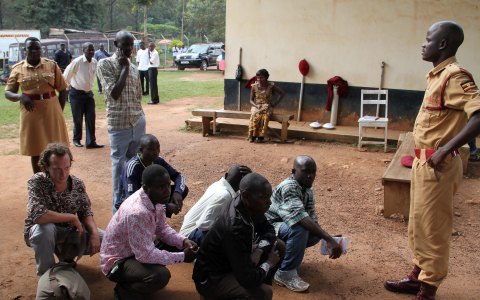British gay play to tour Africa after producer is freed by Ugandan court.
by - 16th January 2013
 Following a court’s decision in Uganda to dismiss a case over a so-called ‘gay play’ on a technicality, its British producer vows to tour it round Africa.
Following a court’s decision in Uganda to dismiss a case over a so-called ‘gay play’ on a technicality, its British producer vows to tour it round Africa.
David Cecil faced up to two years in prison for ‘disobeying lawful orders’ over his play ‘The River and the Mountain’ which censors claimed had homosexual ‘undertones’.
But Cecil, 34, from Harrogate in Yorkshire, was discharged by a magistrate in Kampala's Chief Magistrate's Court, Makindiye, on 2 January after the prosecution failed to provide any witness against him.
Coming two weeks after President Yoweri Museveni warned the West against promoting a gay agenda, the dismissal of the case marks yet another engagement in the battle pitching a conservative, church-backed rejection of homosexuality against a liberal lobby that opponents say is driven by alien Western values.
On December 16, President Museveni told a live nationwide television audience, and a congregation that included several Anglican leaders from Britain, the United States, Canada and Australia at the installation of the new Archbishop of the Church of Uganda, that while Uganda will not execute gays, he is opposed to open shows of homosexual intimacy.
A bill pending before the Ugandan Parliament proposes to take sterner measures against homosexual practice, though a clause calling for the death penalty has been dropped from the bill. Homosexuality is already illegal in Uganda.
Cecil says that there was no agenda to promote gay values in the play, and that their inclusion in the drama was almost accidental.
A father of two, who is married to a Ugandan woman, Cecil says: ‘My motivation was to present compelling drama of contemporary issues when I met Rafiki Theatre, a Ugandan drama group.
‘I was weary of producing incendiary stuff, but when I asked Rafiki what they would do if they had completely free choice (of subject), maybe Walk-to-Work (a civil protest) or corruption, they voted for homosexuality.
‘Almost by accident, I met Beau Hopkins, a poet from Oxford whom I did not know before, in Kampala and when I mentioned that I was going to put on a play he, as a playwright, volunteered to write one and he wrote “The River and the Mountain” in six weeks.’
Cecil says he submitted the script and synopsis to the Media Council, the statutory body that vets print and broadcast material, but he did not hear back until two days before the premiere.
 ‘We did our bit (in scrutinising the play), and we found that it was not fit for public staging, according to the laws of the land. It had undertones of homosexuality, and it depicted Uganda as a lawless country, with people taking the law into their own hands,’ says Dr Goretti Nassanga, chair of the Media Council.
‘We did our bit (in scrutinising the play), and we found that it was not fit for public staging, according to the laws of the land. It had undertones of homosexuality, and it depicted Uganda as a lawless country, with people taking the law into their own hands,’ says Dr Goretti Nassanga, chair of the Media Council.
The producer, who had booked to stage the play at the National Theatre, was asked to wait until the Council had reached a verdict, but he went ahead to stage it at another smaller venue, prompting the charge of ‘disobeying lawful order’, for which he was subsequently prosecuted.
Cecil was arrested briefly, then granted bail, and then appeared before the magistrate four times between September and December 2012.
‘The case was not dismissed on merit; it was for want of prosecution. It was dismissed because the state failed to prosecute it. It is hard to draft charges against this sort of case – there is no complainant’, says Ladislas Rwakafuzi, a Kampala human rights lawyer.
But Stephen Langa, who heads Family Life Network, an anti-homosexuality lobby, says poor preparation by the prosecution led to the dismissal of charges. ‘We have (in the past) offered lawyers to work with state prosecutors on this sort of case, but have never received a response.
‘It is very unfortunate that he got away scot-free. It is cultural imperialism. He is forcing us to accept what is against what we want.’
Francis Onyango, who represented in court, says his client is now a free man, having received his passport back and can now do whatever he wants in Uganda, provided it is within the law.
Cecil says he will not stage the play in Uganda without official permission. But he is looking farther afield, to Kenya and South Africa, from where he says he has received enquiries from several production companies.
FACTBOX
Q: What is the play about?
It is about betrayal and corruption. The main character exposes his boss as a corrupt person, and as a result gets his job. Happy with his new position, the hero then goes on a celebratory run, getting drunk and confessing to his best friend that he is gay. The friend, who is a bit of a failure in life, uses this new information to expose the hero. The friend uses a Christian NGO, Family First, to expose the main character. The former boss and others use his sexuality to cause his downfall.
Q: Why are Ugandans in particular so hung-up about gays?
Male on male rape is an issue in Africa, where lawlessness exacerbates sexual predation, especially as a perk of power. There are few statistics but plenty of anecdote and some historical evidence. The Ugandan Church's foundation myth concerns 46 young Christian men who refused to have sex with the ruler (kabaka), Mwanga, of Buganda in 1884 and were burnt alive on Ascension Day on 3 June 1886 as a result. The date and the story are commemorated as martyrdoms in both Anglican and Roman Catholic cycles of prayer.
Q: What is the situation now regarding the law and homosexuality in Uganda?
An anti-gay bill imposing life sentences on those convicted of homosexual acts was re-tabled in parliament in 2012 and is listed for debate when parliament returns from the Christmas recess. It was first introduced in 2009 but never debated. The MP backing the legislation agreed to drop the clause proposing the death penalty.
- Log in to post comments
